- Home
- Georgette Heyer
Acting on Impulse Page 16
Acting on Impulse Read online
Page 16
And then what would she have done? Married someone she actually chose, when she was actually ready to do so after she’d properly processed her father’s death and her changed circumstances and learned that she did not need a man to take care of or complete her?
Pshaw!
“THE OLD MAID”
INTRODUCTION
“Helen King-Eyre, who was thirty-six and looked forty, stood by the window with her back to her friend and said nothing at all.” Such is the unusual beginning of Georgette Heyer’s last known contemporary short story. Published in Woman’s Pictorial in August 1925, it appeared under the name “Stella Martin,” the same pseudonym which two years previously she had published The Transformation of Philip Jettan. “The Old Maid” is undeniably a Georgette Heyer story, and reading it, it is tempting to think that it has several autobiographical elements – which may be why she used a pseudonym.
It is interesting to note just how often Heyer used the name “Helen” in her fiction: Hélène de Courvonne in Simon the Coldheart (1925), Helen Marchant in Helen (1928), Helen North in A Blunt Instrument (1938), Helen “Nell” Stornoway in The Toll-Gate (1954), Helen “Nell” Merion, Lady Cardross, in April Lady (1957) and Helen Morland in “Hazard” (1936) (reprinted in Pistols for Two, 1960, and Snowdrift, 2016).
It is also worth noting that Heyer’s friend Dorothea “Doreen” Arbuthnot’s middle names were “Helen Mary.” The two must have been very close, for Heyer dedicated Simon the Coldheart (1925 US edition) and Barren Corn (1930) to “Doreen.” Of course, Doreen was not a name she could use in her historical fiction, so it is possible that her repeated use of “Helen,” and even of “Mary” (Mary in “The Chinese Shawl” and Mary Challoner in Devil’s Cub, to name but two), was a subtle tribute to her friend.
The Helen of “The Old Maid,” however, resonates strongly with what we know, not of her friend, but of Georgette Heyer herself, for there are several parallels between the budding author and the fictional heroine. Helen is a famous author; Heyer’s fame was growing. Helen is frank and yet shy, as was Heyer, and both women have “humorous grey eyes.” But it is perhaps Helen’s description of herself that seems so in tune with what we know of Heyer:
She had had her success; men called her “great”; she was the biggest satirist of her day; she had hosts of friends, but she was lonely, for none of the men who admired her genius considered her as a woman. She was a “good fellow”, she was witty, and unusual, and an invigorating companion, but she was too downright to be attractive, too competent and independent.
This is similar to what Heyer’s first biographer, Jane Aiken Hodge, wrote of her in 1984:
Georgette was a self-confessed blue-stocking, that dangerous phenomenon, a female author… She had been shunned at Miss Head’s School because of her sharp tongue, and probably still used unusual words, talked in sentences, and maybe even indulged in an occasional Latin tag… the fact that she was beautiful may well have been counterbalanced by the equally unconcealable fact that she was witty. Friends from every stage of her life remember her dry tongue, her elegant speech, the laughter they shared.
Like Helen, Heyer was frank and competent and independent; like Helen, she was not demonstrative. As an adult, she did not believe in overt displays of emotion or of speaking openly about her deeper feelings – her writing was her outlet for emotion. As an adolescent attending school she had struggled to make friends of her own age because she was mature beyond her years and related more easily to the teachers than the students. As a wife and mother she was kind and generous and proud of her husband and son, but she was not effusive in her affection. Heyer did not readily hug or kiss people beyond what was strictly necessary; she was reserved and shy with all but those inside her close inner circle. The Helen of this story is the same.
In manner and speech she is also very much like the eponymous heroine of the autobiographical novel, Helen (1928), yet to come. The short dialogue between Helen and her friend Anne could almost have been lifted from Helen had it not pre-dated that novel:
“Helen, you needn’t pretend with me.
A hot flush rose.
“Never have.”
Interestingly, the writing of this final short story coincided with the return from Nigeria, after eighteen months away, of Heyer’s dear friend, Ronald Rougier. In 1923 he had qualified as a mining engineer and in October of that year had sailed to Nigeria to take up a position with the Niger Company. It is not known whether Ronald proposed before he left, but if he did, he was not accepted. It was only after his return in the spring of 1925 that Heyer agreed to marry him. Just as Helen is reunited with her old love, Maurice Parmeter, after a long absence in India, so Heyer was reunited with Ronald after his time in Africa. They were engaged in May 1925 and it’s possible that Heyer wrote this story as an outlet for her feelings. For most of her writing life, her books and stories would be an outlet for her emotions.
“The Old Maid” is fascinating for what it appears to tell us of Heyer, but it is also a very entertaining story. The characters live, the dialogue is crisp and revealing, and there is a gruff humour of the type at which Heyer excelled. There is also an element of Jane Austen’s novel Persuasion, with its story of lost love and second chances. Like Anne Elliot, Helen strives to hide her true feelings, and like Captain Wentworth, Maurice Parmeter learns that honesty is the best way forward.
This was to be Heyer’s last contemporary short story. She would, however, write three more contemporary novels. They would sell well, earn good reviews and achieve multiple reprints. Not only would Heyer suppress them within ten years of their publication, she would also exclude from a comprehensive list of her novel and short story publications all but one of her nine short stories that were published in the 1920s. Only the Danish title of “The Chinese Shawl” would remain in her records – a tantalising clue for those keen to know more of a wonderful writer and her feelings about these early, youthful works.
THE OLD MAID
HELEN KING-EYRE, who was thirty-six and looked forty, stood by the window with her back to her friend and said nothing at all. Mrs. Dering eyed her speculatively from her seat by the fire, and surreptitiously smiled.
“You do remember him, don’t you, Helen?” she said softly.
Helen swallowed hard. Did she remember Maurice Parmeter! She’d tried to forget him all these weary years, and miserably failed. And now he was coming home from India for good, and, if Anne Dering was to be believed, he wanted to see her again.
“Yes. I remember him,” she said curtly.
Anne spoke more softly still.
“Helen, you needn’t pretend with me.”
A hot flush arose.
“Never have.”
“Yes, you have. You’ve never told me how you feel about it.”
Helen answered with some difficulty.
“It’s never easy to admit you were a fool.”
“Ah!” Anne straightened in her chair. “I guessed it. You’ve always been sorry you didn’t marry him?”
“Yes.”
Anne went to her, and put her arm around her shoulders.
“It’s not too late, old girl.”
Helen laughed shortly.
“Much too late. I haven’t even seen him—since—since I sent him away. And I was twenty-five then. Don’t suppose he ever thinks of me.”
“He isn’t married, dear. And he says in his letter that he wants more than anything to see you. He wouldn’t say that—being Maurice—unless he still cared.”
“Bosh!” said Helen inelegantly. “Probably he’s got a sentimental feeling about me. That won’t last when he sees me.”
“Helen, without any more nonsense, if Maurice still cared would you marry him now?”
“Yes!” said Helen fiercely.
“Very well,” replied Anne, in a business-like manner. “It’s up to you, then. And I’m determined you shan’t let this last chance slip. You’ll come to stay with me just as we’d arranged before I heard that Maurice was c
oming.”
“I won’t.”
Anne opened wide her eyes.
“Dear me, why not? Are you afraid of the man? After all these years I really can’t see that you need be shy of meeting him.”
This had the desired effect.
“Shy!” snorted Helen.
“That’s settled, then. You’ll come. And Helen, don’t—don’t frighten him! I know what you are. Men don’t like a woman to be as brilliant you are. And, oh darling, do, do be more feminine! Don’t shock him!”
“Anne, if you think I’m going to try and—and catch—Maurice—”
“You’ll be a fool if you don’t,” said Anne serenely. “And considering your views—”
“Damn my views!” said Helen. She turned, and her whimsical, dancing smile dawned. “It’s all rot, Anne. I’m getting old, and if he’d wanted me he’d have come before now.”
“I don’t see it,” Anne replied. “You sent him away pretty decisively in the first place, and he wasn’t the sort of man to hang on after that. And when he was on leave the first time you were lecturing in America. And the next time, my dear, you were engaged to Rupert Arden.”
At that Helen winced.
“What did you do it for, darling?”
“I don't know. It was madness. I was lonely. I admired his genius. We—we had things in common. Heavens, what a fool I was!”
“And now,” Anne said briskly, “you’re sane and unattached, and we shall see what we shall see.”
WHEN Anne Dering had gone, Helen went to the glass and carefully studied her reflection. She saw humorous grey eyes, a face that was lined a little, and innocent of powder, brown hair that was unwaved, screwed into a careless, untidy knot, with ends that escaped from it and straggled over her ears and brow. She saw, too, her neck grown thin and her tall body clothed in a shapeless green garment unworthy of the name frock. All about her, in this expensive flat, was beauty; only she was ugly there and incongruous.
She’d let herself go; she’d thought that her brains counted for more than her looks. When she had sent Maurice away she’d been on the threshold of success. Her first book had been published and the critics were enthusiastic. She had thought that her career must stand first; she couldn’t make up her mind to go with Maurice to India. India belonged to Kipling, but London was hers.
She had had her success; men called her “great”; she was the biggest satirist of her day; she had hosts of friends but she was lonely, for none of the men who admired her genius considered her as a woman. She was a “good fellow”; she was witty, and unusual, and an invigorating companion, but she was too downright to be attractive, too competent and independent.
“One thing is certain,” she told her mirrored self. “You can’t meet him like this. You’re a perfect sight.”
THE long, low touring car, the pride of Helen’s heart, was nearing its destination. Helen sat in the back of it, consumed with unaccustomed nervousness. She was a transformed being. She wore a marvellous little hat over carefully waved hair; her face had been massaged and very skilfully and delicately rouged; her feet were in high-heeled shoes, and a sable coat hid a frock that spelled Paquin quite unmistakably.
“I shall never keep it up,” she thought. “Damn these shoes! Yes, and that’s one of the things I must not say. This man will be the death of my poor car!”
She leaned forward to say a few well-chosen words to her chauffeur but remembered in time her new rôle of helpless femininity. But it was hard to see her car driven by anyone but herself.
They swept into the drive of the Dering’s house; Helen saw Anne on the porch, and Don, her husband, and a tall, square-shouldered figure, the sight of whom made her heart do strange things
“Don’ll give it away, sure as eggs is eggs,” she thought desperately. “I was a fool to come!”
The car drew up; Helen pulled herself together and gazed limpidly into Anne’s astonished eyes.
“Dear Anne!” she murmured, and sweetly smiled.
Anne recovered herself with an effort, and stepped forward.
“Dear Helen!” she cooed.
Maurice was waiting to hand Helen out of the car; as she stepped down she looked at him from under her darkened lashes, and her pulses beat fast. He was the same, save for a few grey hairs at his temples. His eyes held the grave, honest look she remembered so well, and—yes, they were full of admiration.
Don, who had been standing as though rooted to the spot, opened his mouth.
“Good lord, Helen, what in thunder—”
“How delightful to see you, Don!” Helen said and held out her hand. As he took it, struggling for words, she trod heavily on his toe, and whispered:
“Shut up, you fool!”
Don looked rather relieved: this was the Helen he knew, and liked. What she was doing in these extraordinary clothes, and why she talked in a soft, society manner he could not imagine. However, he understood that he was to say nothing, so he grinned cheerfully and wrung her hand.
“You remember Maurice, of course," Anne was saying.
HELEN found herself looking up into those dear grey eyes.
“Of course,” she answered. “What ages it is, Maurice! You are home for good now?”
“Yes, for good,” he said, smiling at her. “This is a very great pleasure, Helen.”
Then Anne bore Helen upstairs, agog with excitement, and almost pushed her into the spare room.
“Helen!” she gasped. “You—you marvel. I never saw anything to equal it! My dear, you look lovely! I nearly had a fit!”
“Don’s probably having one now,” said Helen. “Did you see his face? Oh, Anne, he’s just the same as ever!”
Anne gathered that her friend was not referring to Don. She smiled.
“And did you see his face? Helen, it’s the most wonderful thing I’ve ever known. You’re perfect! That hat! Your hair! Manicured nails! I can’t get over it.”
“I feel a stupid fool,” said Helen, and tossed her hat on to the bed. “And a beastly, low-down cheat!”
“You’ve even brought a maid!” went on Anne, unheeding. “Where did you get that dream of a frock? I hardly knew you! Helen, you’re made up!”
“Too much?” asked Helen anxiously.
“No, not a bit; but you couldn’t take me in. Oh, come downstairs again, my dear! This is the most thrilling thing that has happened for ages!”
There was a twinkle in Helen’s eyes.
“I’ll come as soon as I’ve changed, dearest,” she said in a mincing voice.
The maid came in. Anne met her friend’s wide blank stare, and fled.
TEA was brought to the low, panelled hall, where a fire burned in a barless grate. Slowly, and a little late, Helen came down the stairs, dressed in a tea-gown of filmy mist-blue, her hair elaborately arranged, her feet in tight shoes of silver brocade. Not her usual cheery grin curled her mouth, but a faint, controlled smile.
“Am I late?” she said. “How dreadful of me! Give me a comfy chair by the fire, Don, please. That will be delightful.”
Don swallowed hard, but his lips trembled despite himself. Maurice came to give Helen tea, and he left his own seat to sit beside her. Helen hid her shyness—and she was very shy—and turned towards him.
“Are you glad to leave India?” she inquired. “It seems to get such a hold over people.”
“It has its fascination,” he answered, his admiring eyes on her face, “but on the whole I’m glad to be home again. I’m going to try and find a house to settle down in. You’ve become very famous, Helen.”
Ordinarily she would have nodded, and laughed. Instead she made a little deprecating gesture with her hand.
“Oh! That’s very kind of you.”
“I’ve read all your books, of course. I think that Miriam is my favourite.”
She sat up at that, and for one instant the real Helen showed.
“Why do you say that? I regard the book as—” she broke off, on the very brink of hot argument. “I am
so glad you liked it,” she said.
When tea was over Anne, in some miraculously unobtrusive way, took Don away and left her guests together. Maurice drew his chair nearer, and offered Helen a cigarette. She thought it more in keeping with the part not to smoke, so she shook her head.
“Do tell me all your news!” she said prettily.
“There is nothing to tell. You have done far more than I have. But then, you always had the divine spark in you.”
Helen started to say “Rot!” and changed it to:
“You mustn’t flatter me, Maurice.”
“Impossible,” he said. “You are quite wonderful.”
“You find me changed?”
He frowned.
“Y–es. And yet I don’t know.” His eyes smiled. “You’re more elegant than the Helen I remember. And just as lovely.”
Helen flushed, and began to talk rather hurriedly about India. The time flew. Helen made Maurice talk; she abstained from contradiction, and said very little, but sat smiling and interested. The dressing gong for dinner interrupted them.
“I must fly!” said Helen. “I mustn’t be late again!”
Maurice looked at the clock.
“In the old days,” he remarked, “you used to tear upstairs three minutes before dinner and, I verily believe, dive into the first garment that met your eye!”
“Oh, but I’m older now!” she answered.
“You don’t look it.”
ANNE came into Helen’s room on her way downstairs. At a nod from her mistress the maid departed.
“Heavenly frock,” said Anne. “My dear, he’s struck!”
“Struck what?” said Helen disagreeably.
“Struck nothing. Struck with you.”
“Don’t be vulgar! If—if I could—I’d chuck this horrid sham!”
“Yes, but you can’t, my dear. And it’s just perfect. This room reeks of smoke.”
“Rather stinks of it,” Helen agreed. “I must smoke somewhere, though. Oh, that’s the gong! I wish I’d never come!”

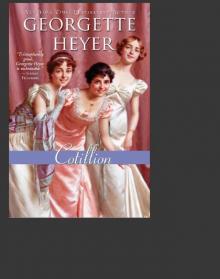 Cotillion
Cotillion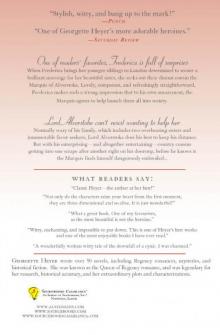 Frederica
Frederica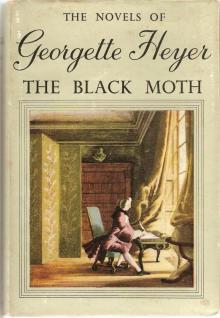 The Black Moth: A Romance of the XVIIIth Century
The Black Moth: A Romance of the XVIIIth Century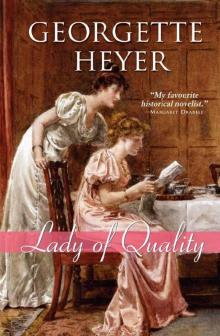 Lady of Quality
Lady of Quality Snowdrift and Other Stories
Snowdrift and Other Stories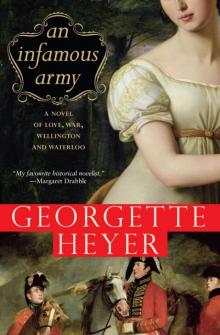 An Infamous Army
An Infamous Army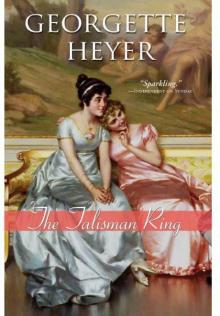 The Talisman Ring
The Talisman Ring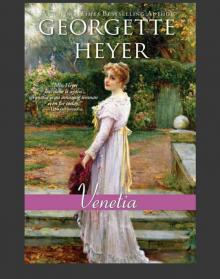 Venetia
Venetia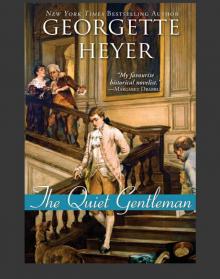 The Quiet Gentleman
The Quiet Gentleman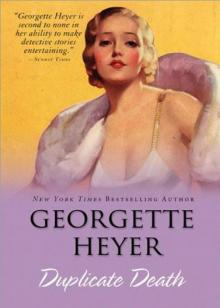 Duplicate Death
Duplicate Death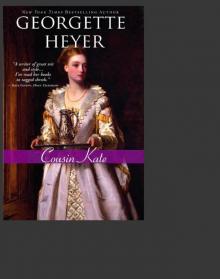 Cousin Kate
Cousin Kate Black Sheep
Black Sheep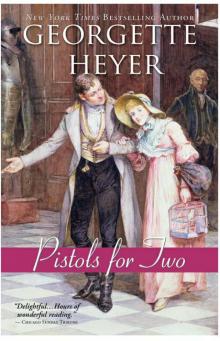 Pistols for Two
Pistols for Two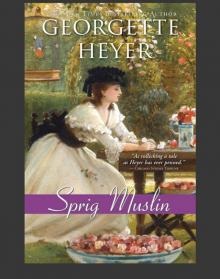 Sprig Muslin
Sprig Muslin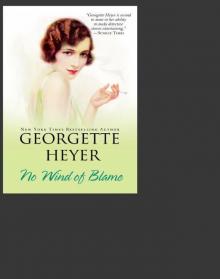 No Wind of Blame
No Wind of Blame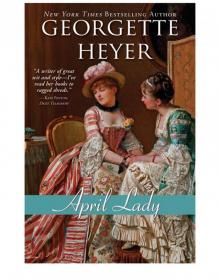 April Lady
April Lady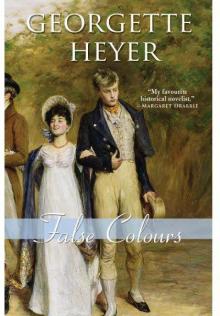 False Colours
False Colours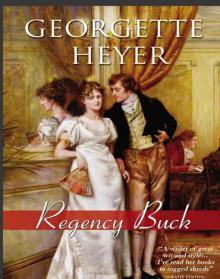 Regency Buck
Regency Buck The Toll-Gate
The Toll-Gate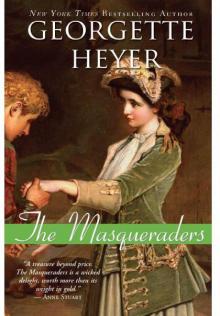 The Masqueraders
The Masqueraders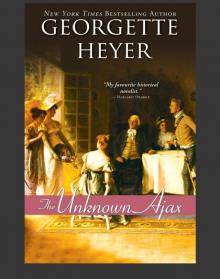 The Unknown Ajax
The Unknown Ajax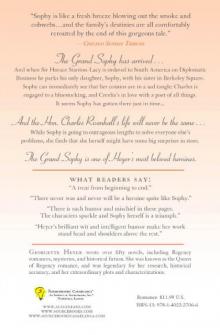 The Grand Sophy
The Grand Sophy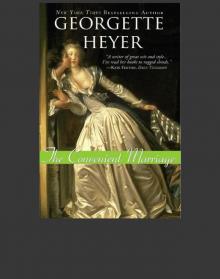 The Convenient Marriage
The Convenient Marriage Faro's Daughter
Faro's Daughter The Conqueror
The Conqueror The Foundling
The Foundling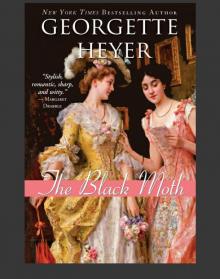 The Black Moth
The Black Moth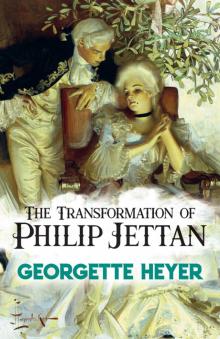 The Transformation of Philip Jettan
The Transformation of Philip Jettan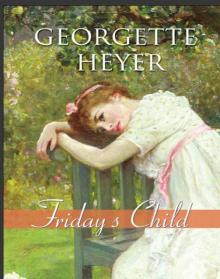 Friday's Child
Friday's Child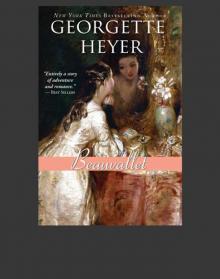 Beauvallet
Beauvallet They Found Him Dead
They Found Him Dead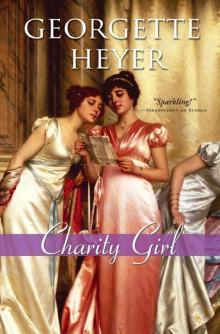 Charity Girl
Charity Girl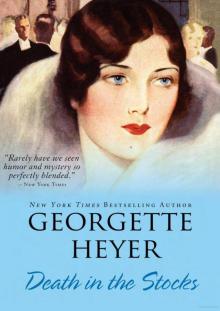 Death in the Stocks: Merely Murder
Death in the Stocks: Merely Murder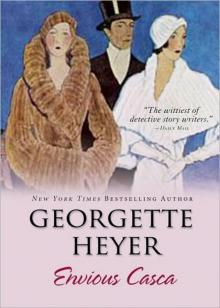 Envious Casca
Envious Casca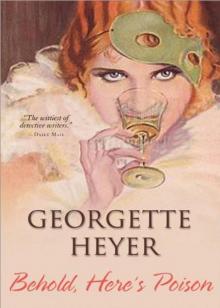 Behold, Here's Poison
Behold, Here's Poison Arabella
Arabella The Nonesuch
The Nonesuch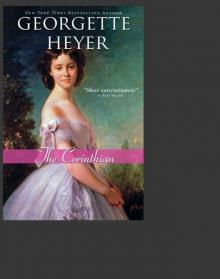 The Corinthian
The Corinthian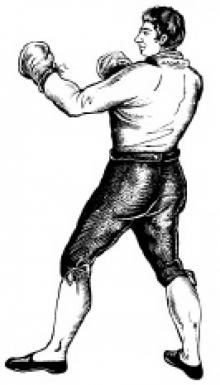 Jennifer Kloester
Jennifer Kloester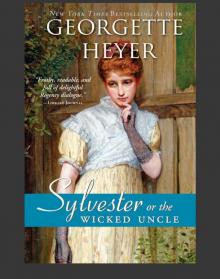 Sylvester
Sylvester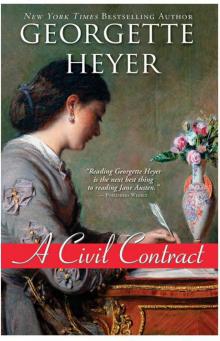 A Civil Contract
A Civil Contract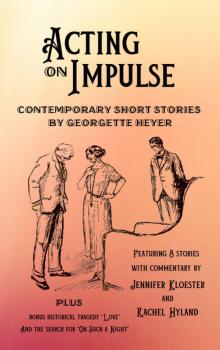 Acting on Impulse
Acting on Impulse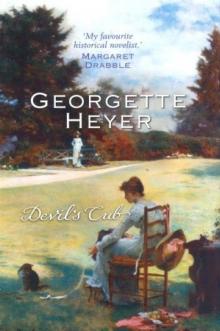 Devil’s Cub at-2
Devil’s Cub at-2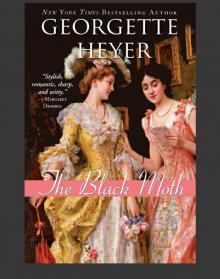 Black Moth
Black Moth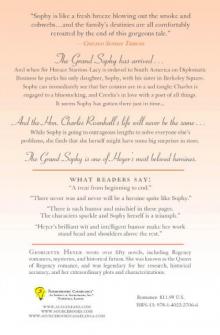 Grand Sophy
Grand Sophy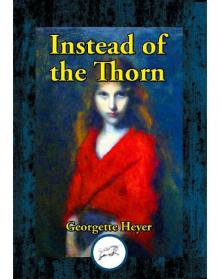 Instead of the Thorn
Instead of the Thorn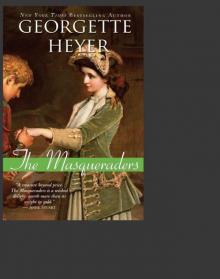 Masqueraders
Masqueraders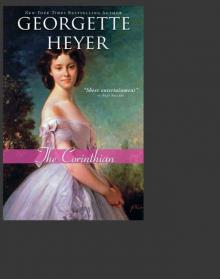 Corinthian
Corinthian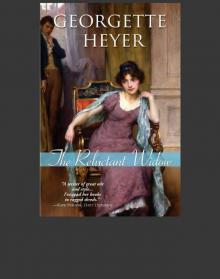 Reluctant Widow
Reluctant Widow